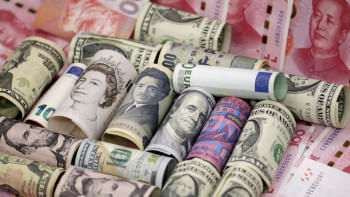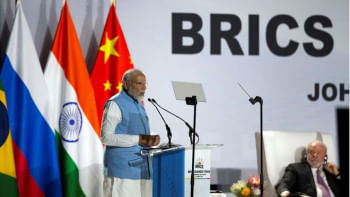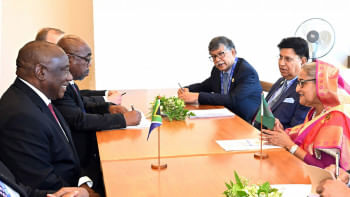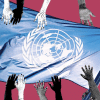Can BRICS de-dollarise the global financial system?

The highlight of the 15th BRICS summit was the agreement to admit six new member countries – Argentina, Egypt, Ethiopia, Iran, Saudi Arabia, and the UAE – which will officially join the group on January 1, 2024. "This membership expansion is historic," said Chinese President Xi Jinping, the bloc's most stalwart proponent. "It shows the determination of BRICS countries for unity and cooperation with the broader developing countries."
Another significant outcome of the summit was the group's declaration to work towards an alternative multilateral currency to replace the dollar. Nicknamed the "bric" by some cheeky observers, this new currency is expected to increase the payment options for emerging markets and developing economies (EMDE), and reduce their vulnerability to dollar exchange rate fluctuations. Obviously, bric will have to compete with special drawing rights (SDRs) and euro, the other currencies popular in the international market. While the hype about a common BRICS currency might be impractical and premature, trading in national currencies is increasingly becoming common.
What has driven the BRICS nations to push for their own currency and embark on this journey to depose the dollar from its pedestal? What are the chances that BRICS will be able to de-dollarise the global financial system? The factors contributing to the de-dollarisation initiative are plenty.
The US dollar is used as a reserve currency and a medium of exchange. Countries hold reserves for many reasons, as a buffer to overcome economic shocks, pay for imports, debt servicing, and moderate the value of their own currencies. The dollar is the most commonly held, making up 59 percent of global foreign exchange reserves, and second comes the euro, accounting for roughly 20 percent.
The dollar is also the dominant international medium of exchange. By one measure, it is now used in 84.3 percent of cross-border trade – compared to just 4.5 percent for the Chinese yuan.
The call for de-dollarisation did not come out of the blue. World leaders and economists have expressed their desire to dethrone the dollar since the 1960s. Former Bank of England governor Mark Carney told central bankers at the Jackson Hole Symposium in 2019 that the dollar's dominance is the "destabilising asymmetry" growing "at the heart of international monetary and financial system."
However, while there has been very little progress in that area, the urgency has increased recently. Extensive US sanctions have driven some countries to transact in other currencies, accelerating the urgency for de-dollarisation. The US relies upon the dollar's dominant currency status to exercise "coercive economic statecraft" and sanction its adversaries.
Following Russia's invasion of Ukraine, an increasing number of countries, including US allies such as India, have explored ways to continue trading with Russia without involving the dollar. Meanwhile, the Chinese yuan has become the most traded currency in Russia.
For a long time, UN Secretary-General Antonio Guterres has called for major reforms of the international financial system. Guterres attended BRICS' expansion announcement, reflecting the bloc's growing influence. He echoed BRICS' long-standing calls to reform the UN Security Council, International Monetary Fund and World Bank.
"Today's global governance structures reflect yesterday's world," he said. "For multilateral institutions to remain truly universal, they must reform to reflect today's power and economic realities."
The dollar's dominance is causing other problems, too. US monetary policy and political decisions have a major impact on smaller economies not to mention the competitors.
China is quite vulnerable to these "dollar shocks." The People's Bank of China, the central bank of the world's second largest economy, is facing a turbulent prospect exacerbated by the chaos in its real-estate market. The People's Bank is lowering rates in contrast to the US Fed's rate-raising efforts. The yuan lost 13 percent of its value versus the dollar since the beginning of 2022.
The dollar reached a 20-year high in 2022. Earlier this year, speculators were betting on its decline, but the Fed's decision on September 20 to hold the rates steady is unlikely to weaken its position in foreign exchange markets. Since July 2023, the US Dollar Index, which tracks its value against six other major currencies, has risen more than five percent.
According to a Brookings Institution research paper entitled, "US interest rate increases and crisis probabilities in developing economies," shocks that have driven US interest rates upward during 2022 are especially likely to trigger financial crises in the developing world. "Further increases in US interest rates can result in more widespread currency distress, given the increase in EMDE debt and the depletion of foreign currency reserves that has taken place of late," it concludes.
Proponents have argued that the bric would protect adopters against devaluation when the dollar rises. There are emerging economic and geopolitical incentives for others to de-dollarise.
The idea that BRICS nations might be trying to break the stranglehold of the dollar is already creating a lot of pushback from the media and others. In an interesting article in Foreign Affairs, Joseph Sullivan, a staff economist at the White House Council of Economic Advisers during the Trump Administration, elaborates on the benefits of the BRICS currency but expects the path to be thorny. "The dollar's reign isn't likely to end overnight," he cautioned. One reason is, BRICS is a very diverse group, and there are economic, political and geographic disparities between Brazil, Russia, India, China and South Africa.
De-dollarisation would need countless exporters and importers, as well as borrowers, lenders and currency traders worldwide, to independently decide to use other currencies. But, it appears things are moving that way. In 2023, BRICS surpassed the global GDP contribution of the G7 countries, according to a BRICS mouthpiece, and accounts for nearly one-third of the world's economic activity. The greenback's share of official foreign exchange reserves fell to a 20-year low of 58 percent in the final quarter of 2022, and 47 percent when adjusted for exchange rate changes, according to International Monetary Fund data. BRICS reportedly accounts for 24 percent of world GDP and over 16 percent of world trade.
The dollar still dominates global trade, and 90 percent of transactions in foreign exchange markets are invoiced in dollars, according to Bank of International Settlements Data. But meanwhile, BRICS' foremost achievements have been in the area of financial cooperation, as evidenced by the establishment of the New Development Bank, the Contingent Reserve Arrangement, and various other financial coordination mechanisms, critical infrastructure to bring forth a global financial system not dependent on the dollar.
Dr Abdullah Shibli is an economist and works for Change Healthcare, Inc, an information technology company. He also serves as senior research fellow at the US-based International Sustainable Development Institute (ISDI).


 For all latest news, follow The Daily Star's Google News channel.
For all latest news, follow The Daily Star's Google News channel. 













Comments